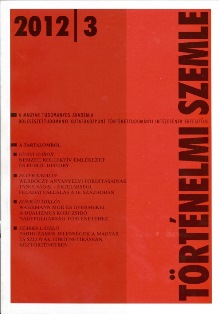A születőben lévő public history. Az emlékezetteremtés kutatásának új megközelítése
Public History in the Making. A New Methodological Approach to Study Memory-Building
Author(s): Anssi Halmesvirta, Kustaa H. J. VilkunaSubject(s): History
Published by: Magyar Tudományos Akadémia Bölcsészettudományi Kutatóközpont Történettudományi Intézet
Summary/Abstract: This article presents an analytical scheme how to proceed with the study of public history, in the sense of public memory-building, in particular. It is divided into two parts: first, we put forward six arguments concerning the study of public history and memory-building in general and give a few examples, mainly from Finland but also from elsewhere in Europe and the wider world, and secondly, we propose a methodology to examine a special field of memory studies, that of memorial or commemorative speeches. At first, it has been deemed appropriate to define the concept of public history. We understand by it non-academic history discourses or such discourses which use or abuse arguments and views on history in public for partisan, day-to-day political and ideological purposes (Cf. Jeremy Black, Using History. Hodder Arnold, London, 2005. “Introduction”). Instances of this are, for example, everyday history debates and quarrels in the media and politicians’ high-flown declarations on history (one authoritative representative of the genre from Finland is the Presidential New Year’s address on TV to the nation in which past, present and future are always nicely and neatly combined in a “success story” which transmits a positive message to the nation). More often than not, this rhetoric is an expression of the so called “banal nationalism” (Michael Billig’s word) which covers the ideological habits and semantic usages that enable the established nations and the rhetoric of nationalism to be reproduced. The second part of the article examines one neglected theme of public history studies, namely commemoration as expressed, preserved and reworked in memorial speeches. Interpretation of memorial speeches means that a text is made to reveal the arguments couched in eloquent persuasion, and we have to read them in the contexts of their intention, “birth” as it were, of commemoration in narrative process, potential reception, mobilization, and in dialogue between the receptors and the original author of the text. Cultural environment is regulated by the narrative process; written and oral narratives are defined by conventional, behavioral and formal rules as well as by the grammar. In the phase of mobilization memories had to meet the reality of community life, its accumulated knowledge and experience as well as the systems of value, attitudes and norms. The memory-speech had to be meaningful and sensible to the narrator and the audience, and it had to make an impact on the present moment of narration and it had to project a commemorative function into the future.
Journal: Történelmi Szemle
- Issue Year: 2012
- Issue No: 03
- Page Range: 377-388
- Page Count: 12
- Language: Hungarian

